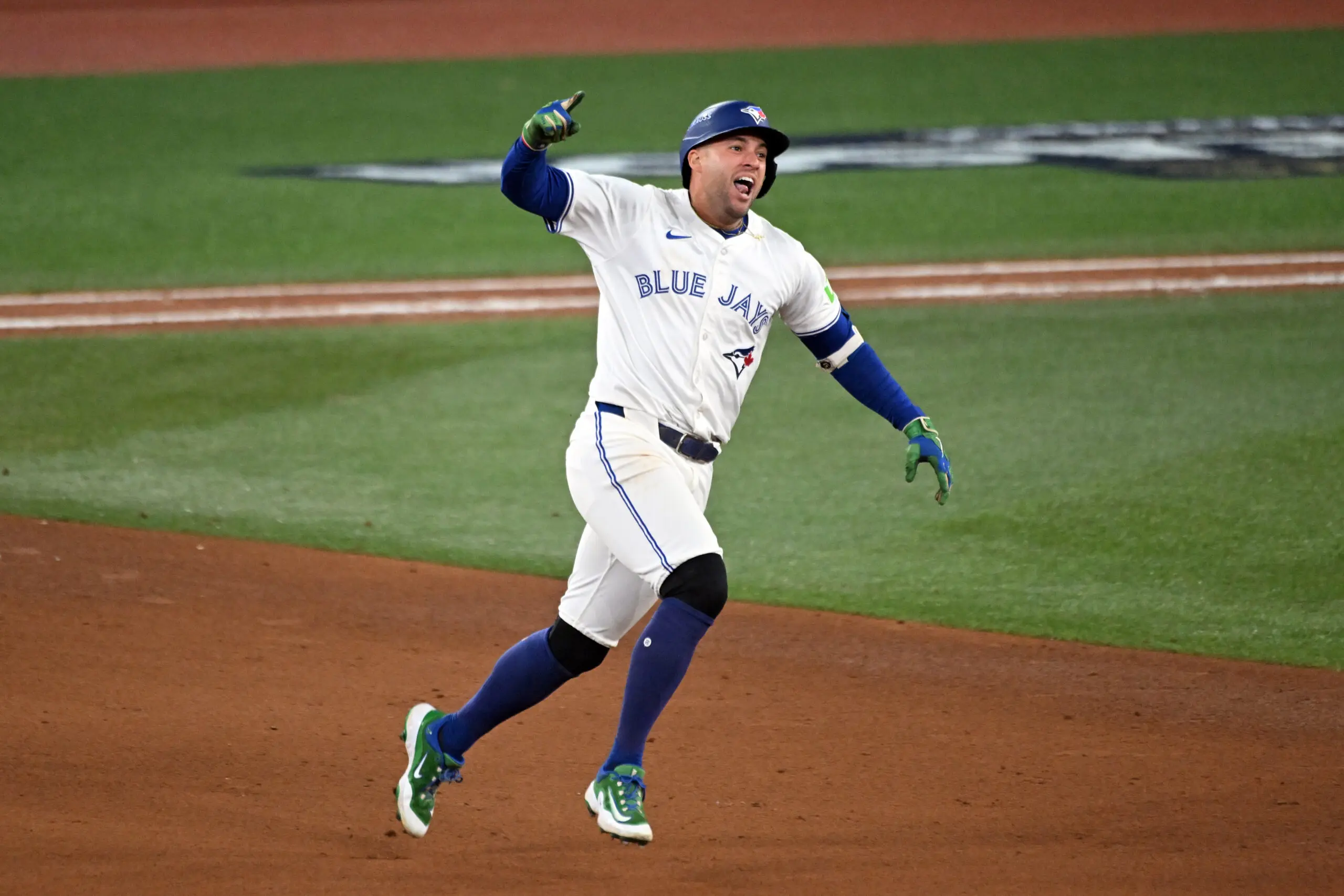A moment etched in time. On this day 10 years ago, José Bautista gave us the iconic Bat Flip 💥
Blue Jays: Comparing the George Springer and José Bautista home runs

Photo credit: © Dan Hamilton-Imagn Images
Oct 23, 2025, 10:00 EDTUpdated: Oct 23, 2025, 01:50 EDT
With one swing of the bat, the Toronto Blue Jays are heading to the World Series for the first time in 32 seasons.
Here’s a fun fact for you: per OptaSTATS, no team has more than one three-run, game-winning home run in the seventh inning or later in an elimination game. Well, that is, except for the Blue Jays. On Monday, George Springer hit a three-run bomb in the seventh inning, catapulting the Blue Jays to the World Series.
This was the fourth time the Blue Jays have hit a game-winning three-run home run in franchise history in an elimination game. Funnily enough, all home runs were hit in Toronto, and all four home runs were hit in a different round.
First was the famous Joe Carter walk-off home run in 1993, which ironically enough, happened 32 years ago to the day. It was also only the second time the World Series had been walked off with a home run. This is indisputably the biggest home run in franchise history.
The least notable of the four home runs came in 2016, as Edwin Encarnacíon hit a three-run blast in the 11th inning of the Wild Card game against the Baltimore Orioles. This isn’t to say the home run wasn’t massive, but it was the first round, so the stakes were low compared to the other two we’ll look at.
In this article, we’ll compare the two other home runs: José Bautista’s home run against the Texas Rangers in the 2015 American League Divisional Series, and George Springer’s home run against the Mariners. We’ll look at the lead-up, as well as the importance of the home run.
José Bautista’s home run
Ten years before Springer hit the home run to put the Blue Jays in the World Series, there was the bat flip home run.
The 2015 season was a special one, especially after the trade deadline. By the end of the season, the Jays finished second in the American League, earning home-field advantage in the ALDS against the Texas Rangers.
That home-field advantage dissipated quickly. In Game 1, the Jays made it close thanks to a Bautista home run in the bottom of the sixth, but the Rangers answered that with a solo shot in the top of the seventh off the bat of Rougned Odor.
The second game was a marathon, going 14 innings. In the eighth inning, the Rangers managed to tie the game at four, and eventually won it 6-4 thanks to four singles in the top of the 14th.
With their backs against the wall, heading to Arlington, Texas, the Jays turned the momentum. In Game 3, the Jays won 5-1, capped off by a three-run home run in the top of the sixth thanks to Troy Tulowitzki. In Game 4, the Jays jumped out to a 7-0 lead, eventually holding on to win 8-4 to set up a winner-take-all Game 5.
The game started normally enough. The Rangers opened the scoring in the first, then extended the lead to two in the top of the third. Bautista hit a double that inning to cut their lead in half, and Encarnación hit a solo blast in the bottom of the sixth. That set up one of the craziest innings of all time, the seventh inning.
An already tense game got even tenser. Odor led off the inning with a single and moved to second on a sacrifice bunt. Delino DeSheilds grounded out, allowing Odor to move 90 feet away from scoring. With Shin-Soo Choo at the plate, Aaron Sanchez threw a 1-2 pitch for a ball. On the returning throw, Russell Martin hit Choo’s bat, with Odor coming to home plate despite the play being called dead.
The umpires overturned it, and after a lengthy umpire review for a rule check, the run stood. As you can imagine, the partisan fans at Rogers Centre weren’t happy, causing another delay. Eventually, Choo retired, and the Jays were down 3-2 with nine outs to save their season.
In another universe, the Rangers wouldn’t turn into a Little League team on defence and commit three consecutive errors. Thankfully, we aren’t in that universe, as they did just that. With the bases loaded, Ben Revere put a ball in play, but Dalton Pompey was thrown out at home. He also broke up a double play by sliding into the catcher, something that would’ve been called a double play in today’s game. Of course, that led to a delay as the Rangers reviewed it.
Still with the bases loaded, Josh Donaldson blooped a ball into the outfield, with Odor missing the catch. This allowed the tying run to come in and bring Bautista to the plate. The rest, as they say, is history.
The bat flip itself led to its own can of worms. In May 2016, Bautista was hit by a pitch in his final at-bat against the Rangers, slid hard into second, and Odor punched him in the face. But the saying goes, “Rather get punched in May than knocked out in September.” The Jays swept the Rangers in the ALDS to head to their second consecutive ALCS.
There are two big reasons why this home run is remembered as fondly as it was. For starters, it was the biggest home run in franchise history, dating back to Carter’s World Series-winning walk-off home run 22 years before it. In those 22 years, the Blue Jays didn’t make the postseason at all.
The other is the tension caused in the top half of the inning. In hindsight, the ball was in play and the correct call was made to give the Rangers a 3-2 lead. When in the moment, you aren’t thinking with reason, you’re thinking the team got screwed over.
When adding context, this home run is huge, but let’s compare it to Springer’s home run in Game 7.
George Springer’s home run
After the Jays were eliminated in five games by the Cleveland Guardians in the 2016 ALCS, a period of rebuilding and subsequent lack of postseason success ensued. In 2022 and 2023, the Jays made back-to-back postseason appearances as a Wild Card team, but lost in two games in each season.
Things were made worse by an abysmal 2024 season, finishing with a 74-88 record, toward the bottom of the league. Coming into the 2025 season, expectations weren’t high for the Jays. At one point in May, they were 16-20, and it looked as if it was going to be a repeat of the previous season. Then, the Jays got hot toward the end of May, surpassed the New York Yankees after overcoming an eight-game lead, and finished with the best record in the American League for the first time since 1993.
They faced the 94-68 in the first round, blowing them out in the first game, blowing a 6-1 lead in the third game, before responding with a 5-2 win to move on to the ALCS. There, they played the team that beat them in the 2022 Wild Card Series, the Seattle Mariners.
Just like in 2022, the Jays lost the first two games and were even down 2-0 early in Game 3. They fought back, though, winning the next two games before a disastrous bullpen decision was made in Game 5, pushing them to the brink. They thankfully evened up the series in Game 6, setting up a winner-take-all Game 7.
The stadium was loud, at least to start. Like they had done in four of the first six games, the Mariners scored first, pouncing on Shane Bieber in the first inning for one run. The Jays responded with a run of their own in the bottom half of the inning, but stranded runners on first and third.
Over the next five innings, the Jays would have a player reach first four times, but they never had a base runner reach second. This quickly quieted Rogers Centre, especially when the Mariners tacked on two more runs to make it 3-1 heading into the bottom of the seventh.
Leading off the inning was Addison Barger, who drew a walk to give the Jays another base runner. Isiah Kiner-Falefa was up next, and he quickly fell to 0-2 in the count, but was able to send the third pitch back up the middle to give the Jays their first runner in scoring position since the first inning.
A sacrifice bunt by Andrés Giménez moved both runners up 90 feet, as the lineup turned over for George Springer. In turn, the Mariners turned to Eduard Bazardo to deal with the top of the Jays’ order. His first pitch was inside, giving Springer the upper hand. The second pitch? Well, again, you know what happened.
GEORGE SPRINGER THREE-RUN SHOT BLUE JAYS LEAD 🤯
As I’m writing this in the early hours of Thursday morning, this home run still feels surreal. In the ballpark, the atmosphere was something I had never experienced before, and not sure I ever will again. I’m positive I’m not the only person who feels this way, because this home run here gave the Blue Jays their first World Series trip in 32 years.
Of course, they need six more outs. Three of which came from Chris Bassitt in the eighth, before Jeff Hoffman struck out the side to officially punch their ticket to the World Series.
Jeff Hoffman was drafted by the @BlueJays in 2014 and traded away in 2015. He returned to the organization 10 years later and just sent Toronto to the World Series!
In 2015, all 49,742 fans in attendance, and millions of others at home, were angry. Rogers Centre was alive, and the home run to deep left field by Bautista released all of that tension. Had Bautista not hit that home run, the Jays had still managed to tie the game earlier in the inning; the home run was just the crescendo.
Springer’s home run had a different type of tension. The building was quiet, as the Jays’ plate appearances in the preceding five innings were less than ideal. Even when they got base runners, they were left stranded. Down to nine outs, they rallied, reignited the building, and booked their ticket to the World Series.
In the end, it all came down to the last part, importance. Bautista’s home run brought the 2015 Jays to within eight wins of a World Series, eventually bowing out in Game 6 of the ALCS. Springer’s home run has brought the Blue Jays to within four runs of winning it all and earned them just their third pennant in franchise history.
Ryley Delaney is a Nation Network writer for Blue Jays Nation, Oilersnation, and FlamesNation. She can be followed on Twitter @Ryley__Delaney.
Breaking News
- Report: Blue Jays, John Schneider continuing extension talks this spring
- Blue Jays Nation’s 2026 Pre-Season Prospect Countdown – No. 15: Blaine Bullard
- Blue Jays pitcher Cody Ponce discusses Spring Training, playing overseas, and the reasons behind his jersey number
- Blue Jays prospect Nate Garkow discusses his journey through baseball
- Blue Jays Nation’s Top 25 Canadian Baseball Prospects for 2026: #1 Owen Caissie
